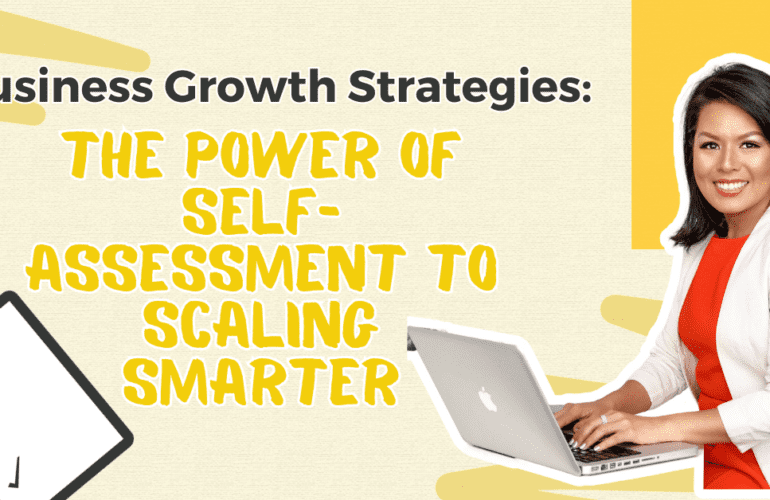Business Growth Strategies: The Power of Self-Assessment to Scaling Smarter
Business Growth Strategies: The Power of Self-Assessment to Scaling Smarter

Photo by Fauxels
Discover how business self-assessment can give you the power to skyrocket your virtual team’s performance towards scalability and success. This might be one of the best business growth strategies you’d ever apply!
Adaptability — have you ever thought how important this virtue is in running a business? It’s the attribute that allows your business to be resilient, to survive, and eventually, to thrive.
Have you recently checked how your business’ adaptability levels are?
If you haven’t, then it’s about time that you embrace the power of self-assessment– a fundamental tool that propels organizations toward sustainable growth!
In this article, we’ll unravel the pivotal role self-assessment plays in the journey of scaling teams, focusing on virtual teams in particular.
We’ll explore how self-assessment can be a game-changer for businesses looking to thrive in an environment that demands flexibility, agility, and the ability to navigate the challenges of team scalability.
Ready? Let’s dive in!
Want tailor-fit solutions to your business challenges? Book a call with our Growth Strategist to empower you to build a scalable team!
Self-Assessment: Your Effective Business Growth Strategies

Photo by Judit Peter
So, how do you ensure that your business is on the right scalability trajectory? Through self-assessment, of course!
Here’s why a regular self-check helps you towards success:
Think of self-assessment as a magnifying glass for your business. It’s the tool that helps you zoom in on the nitty-gritty details of your operations.
It brings into focus the areas where your business shines and, equally importantly, the spots where it might be less radiant. Understanding your business inside out is a fundamental building block of growth.
When it comes to scaling your business, whether you’re a startup or a seasoned player, self-assessment becomes even more crucial.
It’s the litmus test that tells you whether you have the solid foundation necessary for growth.
Are your processes efficient?
Are your team members aligned with your vision?
Are there bottlenecks that need unclogging?
Self-assessment provides these answers, and it’s the first step to gauging scalability.
Benefits of Regular Self-Assessment

Photo by JESHOOTS.com
The advantages of self-assessment extend far beyond just identifying strengths and weaknesses. It’s your toolkit for making informed decisions.
It’s the secret sauce that optimizes your processes and allows you to seize opportunities when they arise.
Regular self-assessment also cultivates a culture of continuous improvement among your team members, encouraging them to adapt and thrive.
And in the context of scalability, virtual teams are a significant player. They bring flexibility and a global talent pool into the picture.
Self-assessment allows you to gauge the performance of these teams, ensuring that they can adapt to growing demands.
The ability to assess their strengths and weaknesses is a cornerstone of effective virtual team scaling.
So, if you want to grow, remember that self-assessment is your steadfast ally. It’s the mirror that reflects your business’s true image, warts and all!
By embracing it, you not only identify your areas of improvement but also pave the way for a more agile, adaptable, and ultimately, a more scalable business.
The Questions That Spark Insights
The next important aspect is to ask the right questions that will reveal the hidden gems and potential pitfalls on your journey to scalability.
Imagine if you regularly take a self-assessment, a kind of treasure map, that could help you uncover these opportunities in the context of virtual teams.
Well, we’ve got something close to that— self-checklist that’s bound to be your scalability compass!
Introducing the “Scalable Virtual Teams: The Self-Check Challenge”

We developed this comprehensive self-assessment with your business in mind.
It’s all about posing the right questions, the introspective ones, that make you ponder the state of your virtual team and its scalability.
From team dynamics to technology adoption, it covers all the crucial aspects.
With the “Scalable Virtual Teams: The Self-Check Challenge” in hand, you can take a close look at your team’s performance and determine if it’s in the right position for scalability… and you can take it for FREE!
Ready to assess your business and unlock new opportunities for growth?
Simply click the link below, grab a cup of coffee, and dive into the world of your business self-assessment.
It’s a journey that will empower you to steer your business towards scalability with confidence.
To Your Scalable Future With Your Growth Partner

Photo by Christina Morillo
Again, self-assessment isn’t just a tool; it’s your guiding star, your compass, and your secret weapon.
It’s the path to clarity, revealing the strengths to build upon and the weaknesses to transform.
The journey to scaling your virtual team with confidence begins with this pivotal step.
So go ahead, take that self-assessment checklist and find out your business health!
And remember, you’re not alone on this adventure.
If you ever feel that you’d like some expert guidance, a bit more clarity, or a more tailored roadmap, our Growth Strategists are just a call away!
The Growth Hub is here to help you navigate the complex landscape of business scalability, providing the support and insights you need.
So, don’t hesitate to reach out, schedule a call, and embark on the next chapter of your business’s growth story. It’s a journey we’re excited to take with you.
With self-assessment as your compass, the path to a more agile, adaptable, and scalable business is clearer than ever.
Here’s to your future success and to the incredible heights your business will achieve!
Ready to seize the moment and kickstart your journey? Book a call with our Growth Strategist today.



























Recent Comments